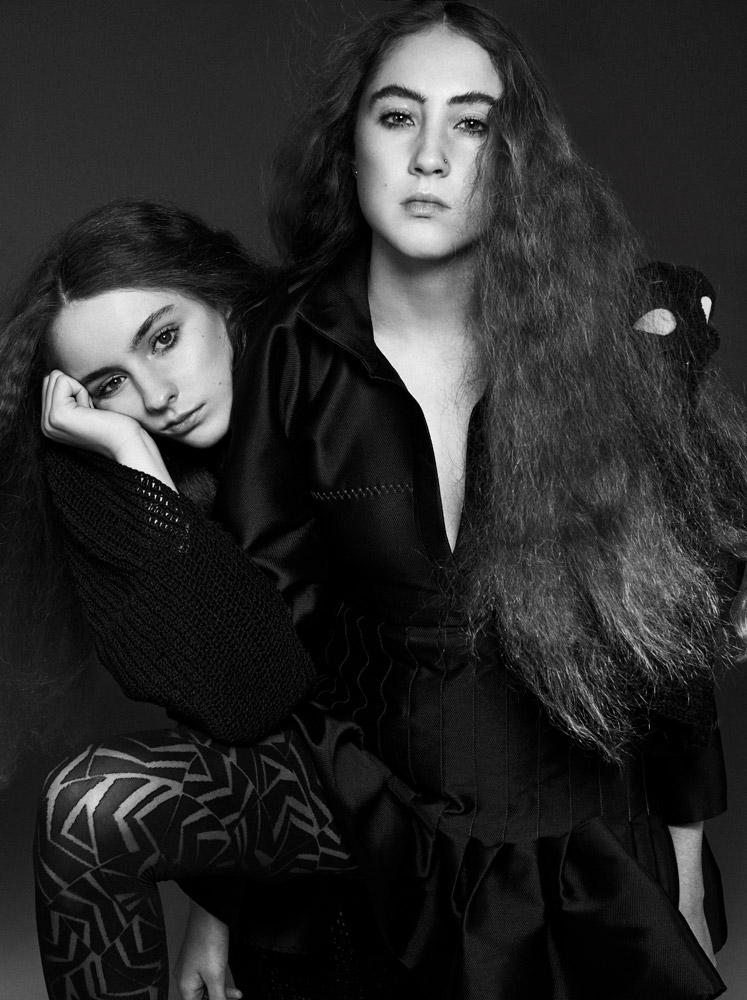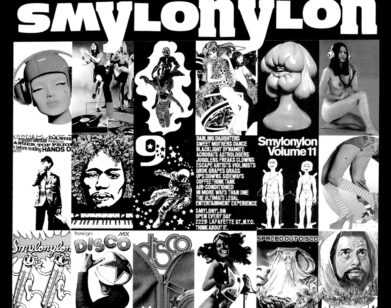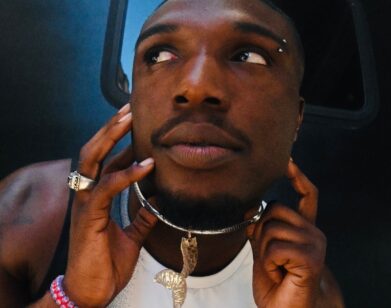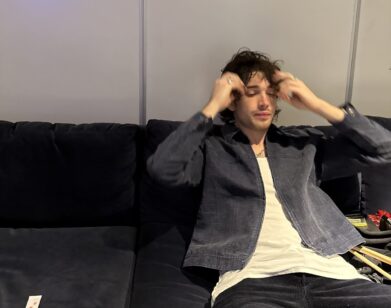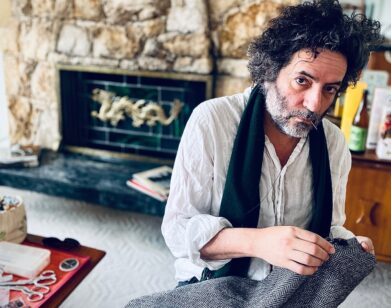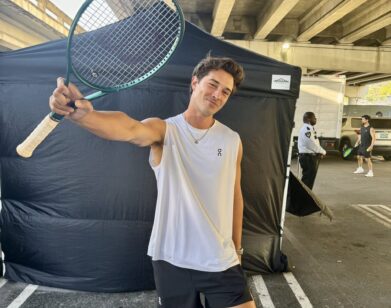The Subversive Duo
LET’S EAT GRANDMA IN NEW YORK, SEPTEMBER 2016. PHOTOS: MICHAEL SCHWARTZ. STYLING: JOSHUA LIEBMAN/HONEY ARTISTS. HAIR: MARTIN-CHRISTOPHER HARPER FOR PLATFORM|NYC/T3 MICRO. MAKEUP: DEANNA MELLUSO FOR THE WALL GROUP/CHANEL. MANICURE: RICA ROMAIN FOR LMC WORLDWIDE/NCLA. PHOTO ASSISTANT: DEAN PODMORE. SPECIAL THANKS: DUNE STUDIOS.
Let’s Eat Grandma began writing their debut album I, Gemini (Transgressive) at age 13, but when they released it in June of this year—in the throes of late teenhood—they sounded anything but juvenile. The English duo consists of Jenny Hollingworth and Rosa Walton, who bonded over drawing at age 4 and have been friends ever since. They craft subversive, unflinching experimental pop that includes nearly three-minute long instrumental intros and bouts of rap. Disguised in their child-like vocals is a dark, playful lyricism, with musings about mushrooms and the monotony of everyday life.
It’s difficult to believe Walton when she tells us that their style was “quite slow to develop,” as together they see a gap in mainstream pop and know just how to fill it. From their band name—which has a noteworthy missing comma (guess where it goes)—to their hand-drawn album artwork, their vision is clear: strip away the saccharine.
Currently, Hollingworth and Walton are doubling up their duties: they’re completing their final year of high school while working on their second album, which is expected in 2017. After graduation they’ll perform at three European festivals. Back at the start of fall in New York, Interview met Hollingworth and Walton the day after their first-ever US performance; we spoke about pop music, fairy tales, and growing up.
THE BASICS: Jenny Hollingworth, age 18; Rosa Walton, age 17.
BORN & BASED: Norwich, England.
FIRST IMPRESSIONS: Jenny Hollingworth: I thought Rosa was quite creative and fun.
Rosa Walton: [laughs] Did you actually think that when you were four?
Hollingworth: Yeah! The thing is, she started talking to me about drawing.
Walton: Did I? I must admit, I don’t remember it very clearly.
Hollingworth: I think you don’t really analyze things so much when you’re really little, but I reckon if I actually think back to it, when you’re a kid you want to hang out with people because they’re fun, don’t you? Basically we were both friends because we’d go along with each other’s shenanigans.
BACK TO THE BEGINNING: Hollingworth: I don’t think I ever even considered music as something I could be good at. I got dragged into recorder practice class—Rosa and me did when we were little. I always enjoyed music, but I know loads of other people are like, “Oh, I want to be a pop star!” But I never even considered it.
Walton: A lot of kids, they really like singing and stuff like that, and think, “I want to be a pop star so I can sing,” but I could never sing in tune as a kid at all. I had to properly train myself. [But] it was never really about that, even though our music is quite focused on vocals.
Hollingworth: I think the first thing I got into was singing, but writing before singing; we didn’t really start writing until we were 13, but we did write a couple of things together before then. I like singing, because when you’re a kid and you don’t know music theory it’s the easiest way to write. It’s way easier than using a keyboard, because you just sing it out of your mouth. It’s still so easy when you hear a song, if you’re listening to something without a melody, you can come up with melodies just like that. You don’t have to bother getting anything out.
FAIRY TALES (BROTHERS GRIMM, NOT DISNEY): Hollingworth: We’ve always noticed the façade that’s in a lot of mainstream pop music of this super sweet, happy world that doesn’t really tie up with reality. I guess it has a purpose, it’s divisive, but for us, we’ve always been into things like horror films and dark stories—also dark music to a certain extent. It has a bit more of a story to tell. People can relate more—like, if you’re in a bad mood, and somebody puts on a really happy album, it’s just going to make you really fucking annoyed. [laughs]
I think there’s something about the way that stories are passed through word of mouth that’s very interesting, and also the fact that loads of these stories have been altered to make them more commercial, just like how things can be in the lyrics of pop music. It’s kind of a parallel, not that we don’t love pop music—there are so many aspects of it that are great—[but] sometimes it’s almost like people are trying to push themselves as the cool thing that is dark, when in reality it’s nothing like what most people’s lives are like. Not that fairytales are or that our music is. It’s just a bit superficial sometimes.
KEEPING IT ONE-ON-ONE: Walton: We don’t write sections separately; we write it together, then there might be a certain bit where we go away and it develop it. We didn’t play [our album] to anyone except each other, really. We just kept it between ourselves.
PERFORMANCE ART: Hollingworth: I think we were always interested in the theatrical element of performance.
Walton: Definitely—that’s an important part of it to us.
Hollingworth: You can’t really stare down the audience if no one’s there. [both laugh]
Walton: Then we’d just stare at each other as we play.
Hollingworth: I think they’re hyperbolized versions [of ourselves onstage]—aspects of our personalities.
Walton: Like different parts of us—
Hollingworth: But really extreme.
A NEW POINT OF VIEW: Hollingworth: Because we wrote [the songs on I, Gemini] when we were a lot younger, when we’re talking in interviews especially, sometimes what we were thinking about when we wrote them differs from now. Because obviously as you grow older, especially when you’re a teenager, your perspective on life changes so much.
Walton: In such a short amount of time.
Hollingworth: So it’s quite hard to try and think back to what your mindset was then.
Walton: Because it’s so different.
Hollingworth: So sometimes, there’s a bit of the delay in how we’ve developed musically and also as people.
WRITING FROM EXPERIENCE: Hollingworth: I think that’s quite valuable, because a lot of people can relate to it, but for us… You have to be strong to do that, in a way, because it’s kind of baring your soul.
Walton: I think also we do do that, but our lyrics are quite cryptic, so people often don’t know what it really means. But it is that underneath.
Hollingworth: It’s like diary writing but with a guard up.
Walton: So it’s meaningful to us, but then for other people, they’re like, “Oh, that’s just a load of nonsense about, I don’t know, mushrooms.” [both laugh]
Hollingworth: Also, we get a lot of visual images that relate to our emotions, so for us, sometimes there’s a lot of feeling behind an image or a metaphor or something that we talk about.
Walton: It’s emotional, but…
Hollingworth: But it doesn’t necessarily seem like that. So in a way, it is quite personal.
FIGHTING CONVENTION: Walton: People often stereotype us because we’re young and we’re girls. They think that we should look twin-y and girly and baby-ish, in a way, and that’s not us at all.
Hollingworth: Yeah. We had a kind of dark thing going when we first wrote the album, and they’ve twisted it into this really girly thing that we never had, and we’ve gone away from that naturally, anyway.
Walton: Because we’ve grown up.
FOR MORE ON LET’S EAT GRANDMA, VISIT THEIR WEBSITE.
For more from our “Faces of 2017” portfolio, click here.

